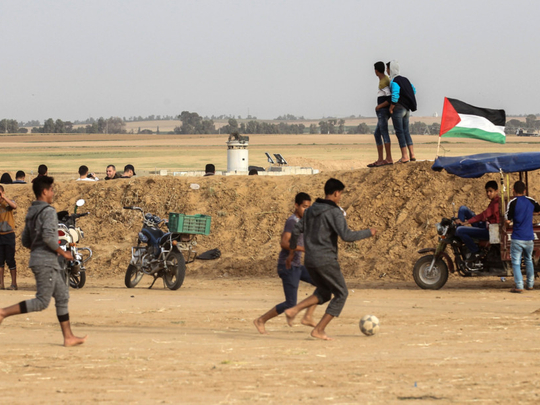
Gaza: Beginning tomorrow, Palestinians are expected to begin setting up tent camps near the border with Israel.
A series of demonstrations are planned culminating with a march to the border fence on May 15, the anniversary of Israel’s establishment, known to Palestinians as “the Nakba,” or catastrophe.
The group aims to mobilise hundreds of thousands of people for the effort, though it hasn’t been able to get such turnouts at past rallies.
“When we march to the border, the organisers will decide then what to do,” said Esmail Radwan, a Palestinian official.
Warning Israel against targeting the protesters, he said “the occupation should not commit any stupidity in confronting the Palestinian crowds.”
Hamas, the group that de-facto rules Gaza, says the demonstration is meant to draw attention to the plight of hundreds of thousands of Gazans whose relatives fled or were expelled from their homes in what is now Israel during the 1948 war surrounding Israel’s creation.
But the first-of-its-kind protest also comes at a low point for the 2 million residents of Gaza, where conditions have deteriorated since Hamas seized control of the territory from the internationally-backed Palestinian Authority in 2007.
An Israeli-Egyptian blockade, along with three wars with Israel and a series of sanctions by Palestinian President Mahmoud Abbas, have left Gaza’s economy in tatters.
Unemployment is well over 40 per cent, tap water is undrinkable and Gazans receive just a few hours of electricity a day.
An Egyptian-led attempt to broker a reconciliation deal between Hamas and Abbas’ Fatah movement took a major downturn earlier this month after a bombing targeted a convoy carrying Abbas’ prime minister and security chief shortly after they entered Gaza. Abbas has blamed Hamas and threatened more financial pressure, such as cutting civil servant salaries or fuel purchases, to force the group to cede control.
“Hamas has realised it’s besieged from three sides” Israel, Egypt and the Palestinian Authority,” said Mkhaimar Abusada, political science professor at Gaza’s Al Azhar University.
“It feels the crisis is suffocating.”
He said that for Hamas, the protests can divert attention from their domestic woes while avoiding renewed war with Israel.
As Gaza’s woes have mounted, Hamas’ popularity has plummeted, and it remains unclear whether the group will be able to mobilise the crowds it envisions.
On Tuesday, bulldozers were busy leveling the five camp locations from north to south.
Trucks unloaded portable toilet stalls, and the Palestinian Scholars Union, which represents Islamic clerics, declared participation in the protests a religious obligation.
Organisers say they are trying to realise the “right of return,” a Palestinian demand that descendants of refugees who lost their homes in 1948 should be able to return to lost family properties in what is now Israel.
Israel opposes any large-scale return of refugees.
The fate of refugees and their descendants has been a core issue in past rounds of peace talks.
Intinerary
The demonstrations will begin after the Muslim noon prayer on Friday.
Buses will carry people from all over Gaza to the five tent camps, situated hundreds of metres from the border fence.
Organisers of the “Great Return March” say the sit-in will remain peaceful through May. But the ultimate plan is to move to the border in mid-May.












